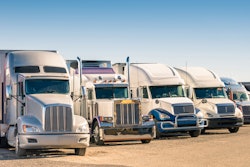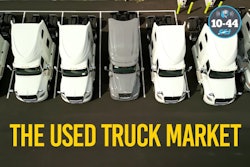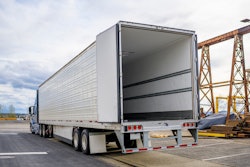Many motor carriers spent 2024 just hanging on and waiting for a market turn that was forecast to happen during just about every quarter but never actually arrived. The good news is 2025 is likely to see improved trucking conditions across the board, but pinpointing the bounce isn’t any easier this year than last.
Contents of this video
00:00 10-44 intro
00:28 Trucking in 2025
00:53 Freight recession
02:20 2025 freight market
03:02 Tariffs and inflation
05:08 Controlling cost
07:09 Integration
09:56 Artificial intelligence (AI)
12:11 Trucking technology
Speaker 1:
CCJs 10 44 is brought to you by Chevron Delo, heavy duty diesel engine oil. Now there's even more reasons to choose Delo with about 50 weeks left in the year. Here's a look at what could be in store for trucking in 2025. You're watching CCJs 10 44, a weekly episode that brings you the latest trucking industry news and updates from the editors of CCJ. Don't forget to subscribe and hit the bell for notifications so you'll never miss an installment of 10 44. Hey everybody, welcome back. I'm Jason Canon and my co-host is Matt Cole. Many motor carriers spent 2024 just hanging on and waiting for a market turn that was forecast to happen just about every quarter last year, but never actually arrived. The good news is in 2025, it's likely to be improved trucking conditions across the board, but pinpointing the balance isn't any easier this year than last.
Speaker 2:
A lot of the expectations we had going into 2024 didn't come true, and the reason behind it is everyone expected things would turn around when it comes to freight rates, but they didn't turn around and I suspect if we look back and try to analyze our past recessions or freight recessions, if you will, they were much shorter and we came out of 'em much quicker. So the 2024 surprised everyone. Everyone thought we would be out of it, but we are not out of the freight recession in 2024. We're only now starting to see some signs and we have yet to see how things are going to go into 2025. Well, if all things stay equal, perhaps, I mean the logic dictates we have to come out because everything that goes down and stays down for a long time, essentially at one point it's actually going to start going up.
However, we have a lot of interesting externalities such as all the tariffs that are taking place between Mexico and the US and we've just recently heard a lot of the apparels were banned going to Mexico. That could actually trickle down to a consumer prices as well. In the US when the prices go up, usually there's less demand for those products. If there's less demands, that means lower rates, so we don't really know exactly what to expect in 2025 given how many different externalities we anticipate. However, if all things stay equal, I agree 2025 should be a really positive year for freight market. Definitely interesting to see how 2025 is going to play out. I still feel, while everyone is confident, I'm actually also confident, but I have this cautious approach to the fact that all these terrors that are going to take place, maybe 2025 is not the year that we're going to see some massive increase in rates. Maybe it's 2026.
Speaker 3:
The curve ball for any inbound market bounce will be the change in the White House, even with some familiarity with the tendencies of a Donald Trump LED administration.
Speaker 2:
I strongly believe any drastic change, especially when it comes to tariffs and imposing different bans across countries, will at first increase consumer prices. It might be really good down the road, but it will probably take a few years until it takes shape. The way I look at any policies implemented, we never reap the benefits right away. It takes few years to take shape. So if we are going to go aggressively when it comes to tariff wars, that's something to be interesting to analyze because I actually believe things are not going to get any better. I believe we're going to be fighting inflation and federal reserve. There's another interesting side to it. Federal Reserve is fighting inflation. By keeping the interest rates high, they're only now starting to lower the interest rates. However, in the month of October, the inflation rate was 2.6 annually rate and in the month of November is 2.7, so it's climbing and now Federal Reserve is trying to lower their interest rate in order to be able to service the debt.
The US debt, that's not going to help inflation. We might see another few points increased in inflation and if tariffs are going to start taking shape, that's again going to hit our inflation and every time inflation hits at the end of the day there's less demand and that's my opinion. There's less demand for those products when there's less demands for products, essentially trickles down to how many truckloads we have to deliver. And if consumers have less demand, that means less demand for truck capacity. When there's less demand for truck capacity, obviously the freight rates are going to be depressed.
Speaker 1:
That's one side. The other Nick says is that a suppressed market has forced motor carriers to operate more efficiently and those with tight cost controls in place stand to benefit the most.
Speaker 2:
Up until the pandemic carriers didn't really care about cost because things were great, everyone was making money. Now everyone is realizing, well, we're not really climbing out of this freight recession, so what are we to do? Well, one of the things that where the carriers are able to control is to control their costs, but how do we control costs in the midst of inflation? So one solution that's become very popular in the past few years is to do offshore near shore talent that's actually helping carriers reduce their costs, which is probably another reason why the freight recession has lasted much longer because a lot of the carriers had more money in their banks due to the fact that they were saving a lot more. And when you have more money in your banks, you're able to actually survive or weather through a freight recession. And again, that's my opinion, but that's kind of how I see things going and this is actually going to accelerate given that the tariffs are going to hit and everyone wants to survive in this environment.
I believe more people are going to be hired offshore and near shore in order to suppress the costs of labor. The other side is you need to invest in efficiencies. So people are going to look even harder at tools such as AI tools, all kinds of automation to make sure we're able to process more freight, more data with less people. So these are the two things that a lot of the carriers are going to start looking at, realizing this is the new normal, and if this is the new normal, we need to figure out how to make a profit. How do we make a profit? We need to have one offshore nearshore talent, and two, we need to invest in sophisticated technology to be able to process more information with less people.
Speaker 3:
Business optimization can mean 50 different things to 50 different people across 50 different departments, but Nix says there is a square one with an almost universal benefit integration.
Speaker 2:
What works in a carrier market we're running a carrier efficiently is when you're able to combine multiple different solutions into a one unified holistic experience, and that's actually very, very difficult to do. Up until now, we've seen a lot of companies onboarding different platforms and somehow integrating them via APIs or spreadsheets or BI tools in order to make sense as to what's going on and to drive more efficiencies. But you really need to hire more IT people to be able to manage all that. So what I believe is next is to be able to take those silos and unify them where all of those silos are intertwined together and work seamlessly as one holistic experience. Once you're able to do that, that's when you drive a lot of efficiencies across your entire organization, starting from the way you source business to the way you fulfill those shipments, to how you pay your drivers, vendors, and how you invoice your customers, and it's just an entire cycle. Then it goes all the way back to sourcing business again, all of those have to be tight and we have to eliminate friction between sourcing department, fulfillment department and management department, and only if you're able to combine all those silos into a one unified solution, you're going to be able to drive a superior efficiency. So it's not really ai. I am against AI machine learning if it's a standalone product I am for ai. If that AI is part of an integrated chain, so to speak, in the entire organization,
Speaker 1:
AI is the technology boogieman. It's this big scary thing that learns on its own and no one really understands it because it changes every day, but it doesn't have to be that way. There's a smart way to deploy useful AI in trucking operations, and Nick tells us how after a word from our sponsor,
Speaker 4:
We serve customers from Birmingham, Alabama to the Gulf Coast, so our people and our trucks are booked solid all day. There is no slack in our schedules. These trucks can't break down. I choose an engine oil that takes care of the number one issue with our engines emissions, so we don't have to worry about DPF clogging. I choose the engine oil that keeps our trucks hauling. I choose delo 600 a DF.
Speaker 2:
If you're building AI for the sake of building AI, and nothing is really proven, it really makes no sense. So one of the things that fleets have a need for is the ability to parse different data from different documents, rate confirmations, contracts, bill of lading, so on and so forth. Instead of having human touch, you're able to parse that data using ai, reading the documents in a way where it makes sense, and you're able to populate all the particular data from those documents no matter what the format is into the platform. And once you're able to do so, now you could eliminate a lot of data entry people where they no longer need to build loads from the beginning, all you have to do is just dump the PDF, so to speak, and machine learning AI is supposed to build that load for you. Then on the other side, once you deliver the load, you have a lot of different moving parts.
You need to match the proof of delivery with the rate confirmation with the invoice, and instead of having someone in the accounting department to go through all that paperwork, all of a sudden you could apply AI to be able to match all of that. And if it's matched and you complete the shipment, and once you complete the shipment, you should be able to tell the accounting department, Hey, now this driver or carrier you are able to pay and you could actually invoice the customer without touching anything. The only time you involve a human being is when in this case is when something doesn't match, there's a discrepancy. Then you move this particular load into a discrepancy dashboard so that human being beings are able to understand exactly what's happening. The bill of lading or the proof of delivery is missing, or there's a shortage on proof delivery and that needs to be addressed before it's too delayed, so on and so forth. So that's just one example. The data parsing is super important in carry operations, and that's where we waste a lot of our human touch, A lot of human time
Speaker 3:
Technology is expensive, but it's not necessarily something smaller fleets have to give up on. You just have to have a strategy.
Speaker 2:
So in the past 10 years or so, the cloud has been born, and building software in the cloud is different than building on-prem. So most of the technologies up until 2015 in our space were built on-prem. Building technology on-prem is very different than building it in the cloud. With the cloud being so expansive and everyone is adopting cloud, we now are able to take advantage of all the tools that's been built by Microsoft, Amazon, and Google, and we're able to provide this technology to carrier that don't have a big budget, and that's what's happening nowadays. We have a lot of very sophisticated talent that no one have the experience to build a technology in the cloud, and they have gained their experience from Netflix of the world, from Microsoft of the world, from Google of the world, and now a lot of this talent is moving into logistics space and they're able to deploy the same type of technology and with that kind of technology, carriers could be rest. I mean, they don't even have to worry about high costs because that's already incorporated by all those billion dollar companies that have been billing this for years, and the cost has been really taken care of by those companies. All we have to do is basically pay for the services that we need to pay in the cloud.
Speaker 1:
That's it for this week's 10 44. You can read more on ccj digital.com. While you're there, sign up for our newsletter and stay up to date on the latest in trucking industry news and trends. If you have any questions or feedback, please let us know in the comments below. Don't forget to subscribe and hit the bell for notifications so you can catch us again next week.











